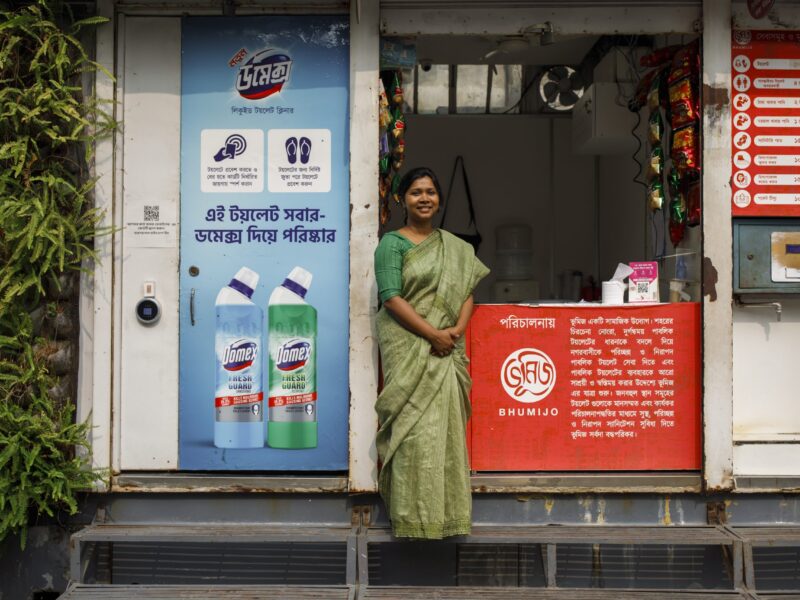Social and behavior change tools that aim to increase the adoption of healthy habits and behaviors can also be used to help businesses in related sectors foster healthy communities as well as sell their products, resulting in a “win-win situation.”
In a recent example out of rural Ghana, the Johns Hopkins Center for Communication Programs – partnering with an international aid organization, a private sector company and a small local enterprise – showed how interpersonal discussions about the health benefits of better sanitation could influence demand for micro-flush and composting toilets that require no or minimal plumbing and water to flush.
CCP often relies on a range of approaches to help communities make better choices about family planning, malaria, maternal health and water, sanitation and hygiene (WASH) issues. So, they wondered, how could they help a local business – in this case, Toilet Engineers, a toilet installer in Northern Ghana – improve community-wide sanitation practices while also making a profit?
On August 27, CCP’s ‘Kuor Kumoji will present their findings – and share a toolkit to help other WASH-related businesses follow the same path – in-person and virtually at World Water Week in Stockholm, the leading international conference on global water issues. Last year, the meeting drew 15,000 people from more than 190 countries.
Using influence mapping, social network analysis and business monitoring data, CCP, as part of the TRANSFORM project sponsored by the United Kingdom’s Foreign, Commonwealth and Development Office, cleaning products giant Unilever and EY, showed how decisions such as the purchase and installation of a toilet, are made by community members.
“Successful businesses can’t just focus on the bottom line,” Kumoji says. “To sell micro-flush toilets, for example, small businesses need to engage with consumers in an empathetic way that shows they understand the context and realities faced by those without appropriate sanitation facilities.
“For example, it’s dangerous to go into the bush at night, uncomfortable to have to openly defecate in the rain, or embarrassing if you don’t have a toilet facility for your guests. The demand needs to be created with evidence that the business understands the customer’s needs.”
The researchers learned that satisfied toilet customers were influential promoters of WASH discussions in the community. People who purchased toilets tended to show off their new accommodations to their family and friends, and talked about how life changing it was to not have go outdoors to go to the bathroom.
“You know, happy clients recommend your products and make more referrals,” Kumoji says. “It comes back to your business, the business grows and communities become healthier.”
Kumoji says this is where business owners can become authorities about the greater benefits of owning toilets.
“When you talk to your clients, also start talking about the critical times to use your water and how to maintain your toilet,” she says. “People get these new micro-flush toilets in their home that just look like a modern toilet, but people aren’t in the habit of cleaning them because they’ve only had pit latrines and community toilets that are usually not cleaned and are smelly and unsanitary. This also needs behavior change.”
The team also captured interesting insights about gender roles in WASH discussions among community members.
There was a healthy discourse about WASH issues among women, who spoke more often with one another about these issues than with men. They were also surprised by some of the non-traditional groups who were perceived to influence WASH decisions, including toilet installers, tenants who demand these services from their landlords, food vendors, women who work in markets and even drivers who want clean places to go to the bathroom while on the road.
Register for free online participation here.





